For some reason, owners of bearded dragons are fascinated with feeding their pets various types of foods.
There’s some kind of weird satisfaction watching your bearded dragon chew a green salad and looking hilariously disinterested while doing so.
Well, if you’re thinking of making peppers a part of your dragon’s lunch menu, you might want to read this article first.
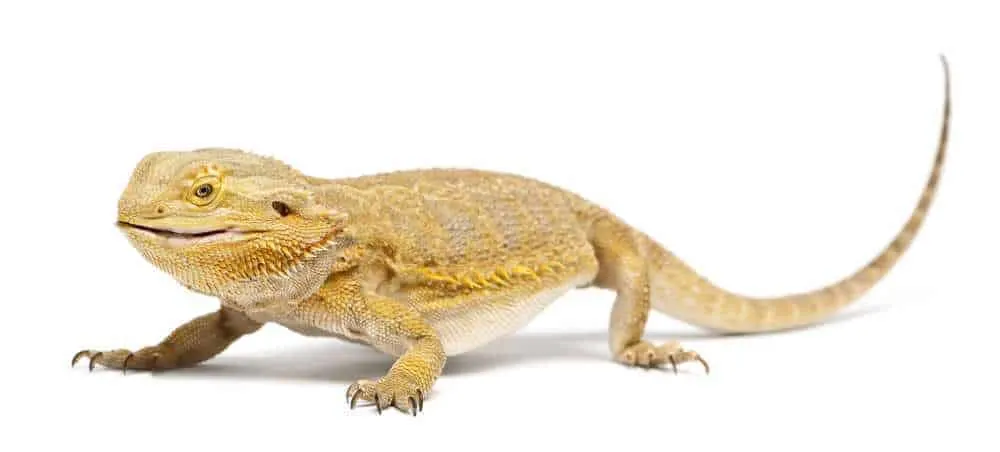
Can Bearded Dragons Eat Peppers?
Bearded dragons can eat peppers. Although, there’s a lot of false information on the Internet regarding hot peppers and reptiles; something will try to debunk in this article. Also, just because bearded dragons can eat peppers doesn’t necessarily mean you should make it an everyday thing.
But don’t worry, we’ll provide you with all the information you need to make sure your dragon doesn’t eat anything it’s not supposed to.
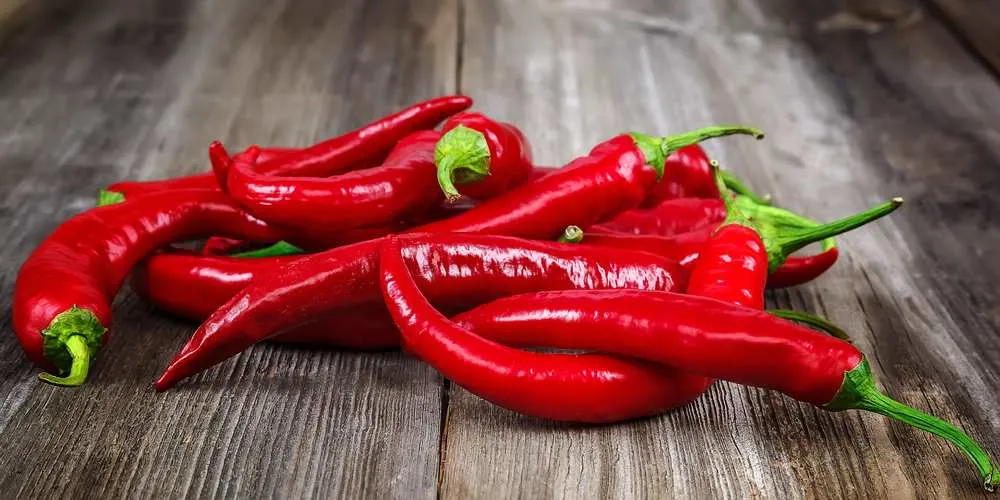
Capsaicin Myth
We want to cover this one first.
The Internet tends to be full of misinformation, one of those being that all animals can’t eat chili peppers (hot peppers).
More precisely, if they do eat chili peppers, some awful things will happen to them.
This is indeed true for mammals, and this is due to capsaicin.
Capsaicin is the compound found in hot peppers that makes them, well, desirable.
For animals like cats and dogs, this can be detrimental as their sense of smell and taste is quite developed.
Also, capsaicin is used in pepper sprays since it causes our eyes to burn and tear up( due to physical, not due to emotional pain).
On the other hand, reptiles and birds don’t respond to capsaicin since they don’t have any capsaicin receptors in their body.
The hot taste isn’t really a problem since birds and reptiles have less than 50 taste buds on their tongue; in comparison, humans have around 10.000 taste buds.
Does this mean we recommend you start buying jalapenos in bulk and feed them to your bearded dragon? Of course not.
This is an explanation for those with the “Oh no, my bearded dragon ate a hot pepper, what should I do?” situation.
Don’t worry; one (accidental) hot pepper shouldn’t be a problem.
We don’t recommend you give your bearded dragon any hot peppers.
This is due to a lack of proper research and since we’re not about to start feeding our bearded dragons hot peppers just to find out.
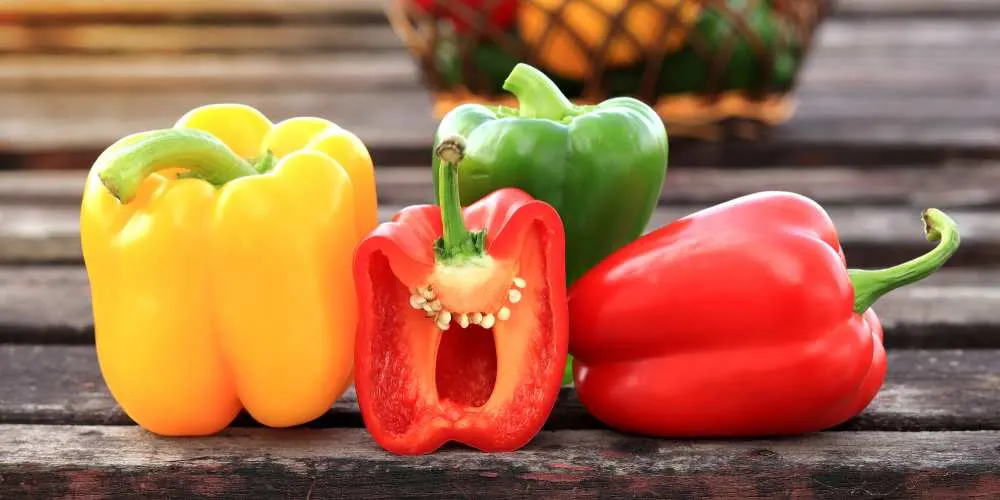
Bell Peppers
With hot peppers out of the way, we’ll concentrate on bell peppers for the rest of this article.
First, let’s cover the nutritional information.
Before feeding your dragon, we recommend looking at the nutrition chart of the food to make sure you’re not serving it any empty calories.
One thing you should always keep your eye on is the calcium amount.
Calcium is vital for your bearded dragon to stay healthy.
| Name | Amount | Unit |
|---|---|---|
| Water | 92.21 | g |
| Energy | 26 | Kcal |
| Protein | 0.99 | g |
| Total lipid (fat) | 0.3 | g |
| Carbohydrate, by difference | 6.03 | g |
| Fiber | 2.1 | g |
| Sugars | 4.2 | g |
| Calcium, Ca | 7 | mg |
| Phosphorus, P | 26 | mg |
| Sodium, Na | 4 | mg |
| Vitamin C | 127.7 | mg |
| Iron, Fe | 0.43 | mg |
| Vitamin D (D2+3) | 0 | µg |
| Vitamin B6 | 0.291 | mg |
| Vitamin A | 157 | µg |
| Vitamin E | 1.58 | mg |
| Vitamin K | 4.9 | µg |
The nutritional chart shows us that bell peppers aren’t really that high in calcium.
They are safe to eat but don’t provide any particularly outstanding nutritional value to our bearded dragons.
However, that doesn’t mean bell peppers are empty calories.
There’s a good amount of vitamin C, E, B6, K1, and quite a bit of vitamin A.
Antioxidants are there to prevent inflammation, improve immune system response, and aid in digestion.
Vitamins B6 and E help in red blood cell creation, repair damaged cells, and play a part in preventing inflammation.
Vitamin K1 prevents blood clotting and, similar to calcium, improves bone strength.
Vitamins A and C strengthen the immune system, reproduction, vision, and growth.
Also, like most vegetables, peppers are mostly made up of water which means they are an excellent way to keep your beardie hydrated (you should still make sure they have plenty of water).
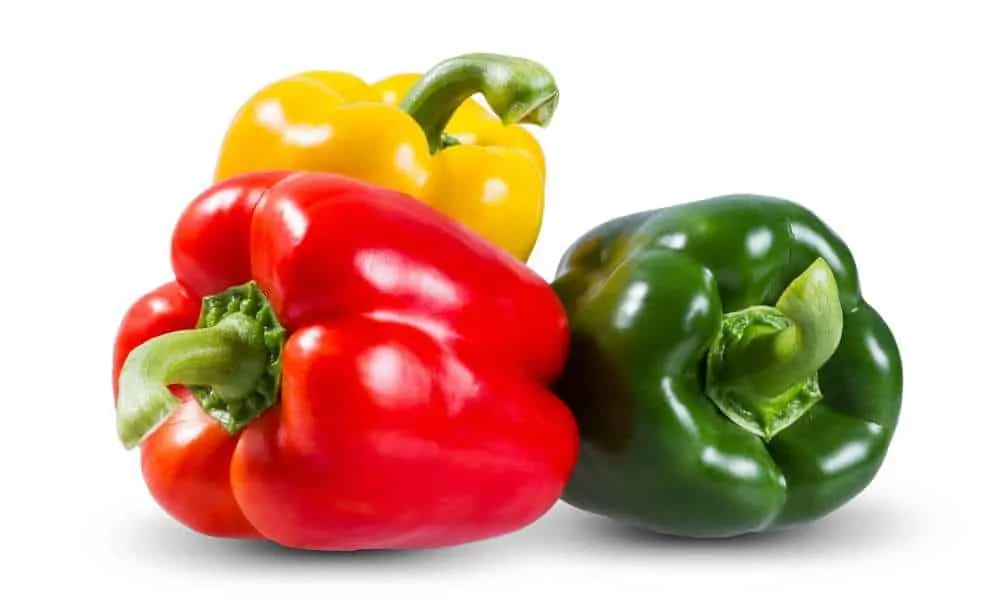
Different Types Of Bell Peppers
There are three general types of bell peppers — green, yellow and red.
Yellow and red peppers are ripe, and those are the ones we recommend you give your beardie.
Green peppers are fine, but they’re not as rich in nutrients.
On the other hand, they are cheaper and still offer a good amount of vitamins.
At the end of the day, it’s up to you to decide what’s the best pepper for your pet.
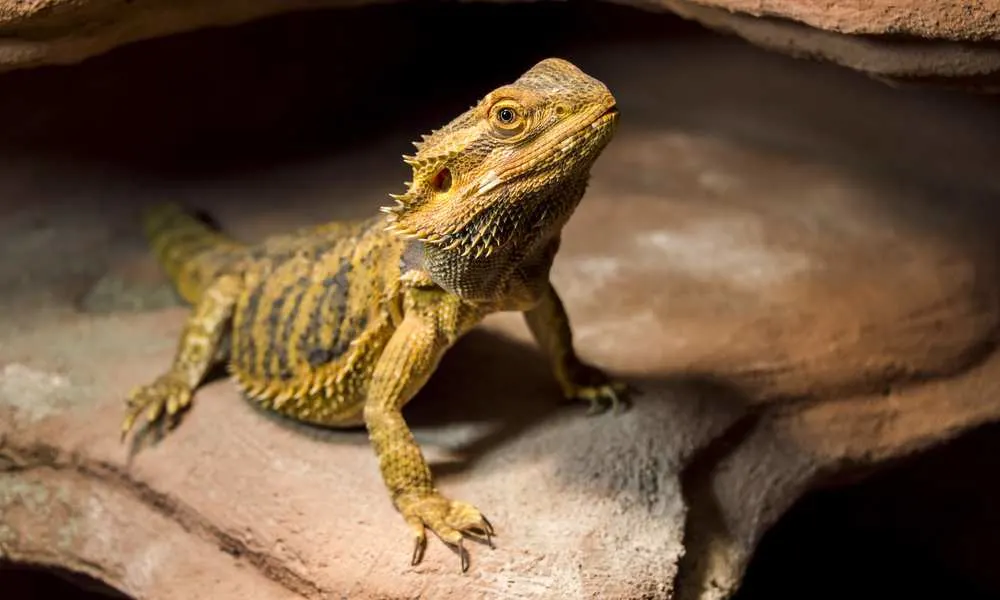
Why Can’t They Have Peppers Every Day?
There are a few good reasons we wouldn’t recommend making peppers a daily thing for your beardie.
1. Poor Source Of Calcium
As we saw in our nutrition chart, bell peppers don’t have that much calcium. But why is calcium so important?
Calcium is essential for bone growth, bone maintenance, proper muscle function, and metabolism.
When calcium levels are low, your bearded dragon may start suffering from something called hypocalcemia, causing it to be lethargic and weakening its muscles.
Also, an even bigger concern is the condition metabolic bone disease (MBD), where the body compensates for the lack of calcium by using the calcium stored in the bones.
MBD is developed when there’s inadequate calcium to phosphorus ratio and not enough vitamin D3.
Vitamin D3 is essential for proper calcium absorption.
If there’s not enough D3 and too much phosphorus, the calcium stores get quickly depleted since phosphorus binds to calcium preventing proper utilization.
This is risky for all reptiles, but especially the ones that are still in development since it can make their bones too weak and prone to fractures.
This means that there’s no reason to feed your beardie bell peppers every day since it won’t get that many benefits.
In fact, it might even cause some problems, let’s explain.
2. Too Much Vitamin A
Too much of a good thing can turn into a bad thing.
Bell peppers are loaded with Vitamin A. Bearded dragons need vitamin A for their eyesight, reproduction, and overall growth.
However, most owners use vitamin supplements to make sure their beardies don’t suffer any vitamin deficiencies.
Giving them peppers too often, along with vitamin A supplements can result in hypervitaminosis A ( too much vitamin A) which can cause lethargy, weight loss, and swelling.
So if your beardie is already consuming enough vitamin A through supplements and its diet, we recommend you skip the peppers.
3. Too Much Water
Bell peppers are around 90% water. It’s common knowledge that water is healthy, and we’re not about to dispute that.
However, too much water can cause your beardie to have diarrhea.
A lot of owners overlook this fact if their pet develops diarrhea, thinking it can’t be the vegetables given that they’re so healthy.
They are healthy, but you should maintain the optimal ratio, which is 10-30 ml of water per kilo every day to prevent overhydration of your beardie.
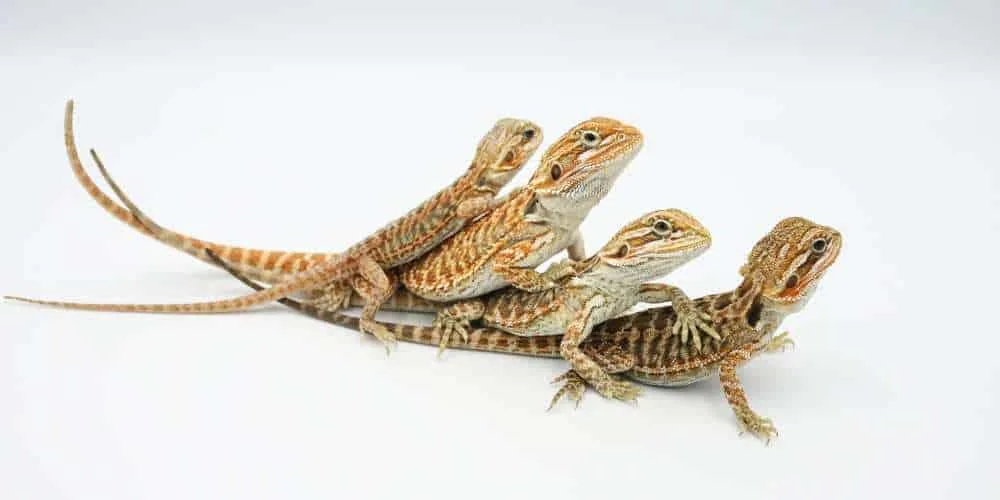
Can Baby Bearded Dragons Eat Peppers?
Yes, there isn’t any particular reason as to why baby beardies wouldn’t be able to eat bell peppers. However, a diet of a baby bearded dragon is even more important than that of an adult beardie.
The first two years are vital for proper development and feeding them bell peppers won’t provide nearly enough nutrients.
Make sure they eat plenty of calcium-dense foods and doing some research on their diet is always recommended.
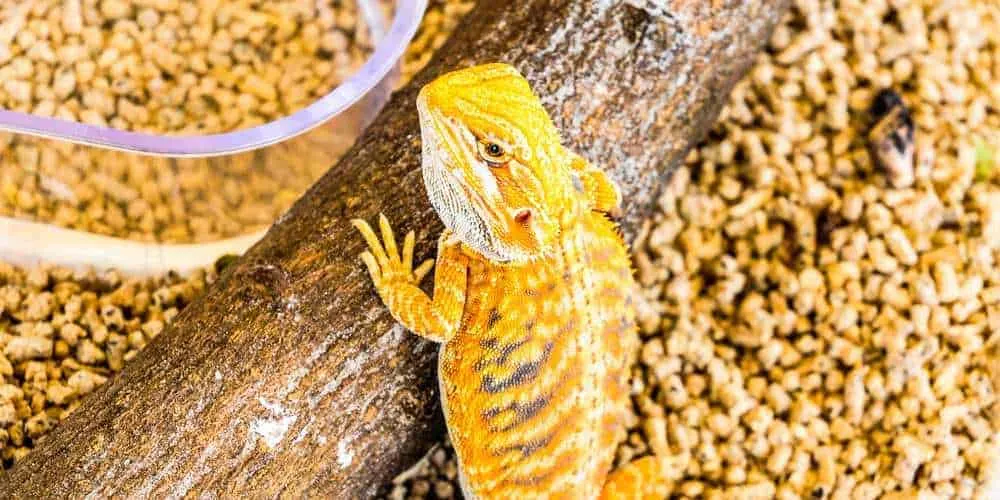
How To Serve Peppers To Your Bearded Dragon?
Throwing a bell pepper in your beardies enclosure and letting it go to town might not be a very effective way of feeding.
Firstly, remove all the seeds and dice up the peppers into small cubes, ensuring your beardie doesn’t have a hard time munching on them.
Secondly, we recommend you mix the peppers with some other vegetables, basically making a vegetable salad. This will add to the variety of your beardie’s diet.
Also, make sure you’re using a proper bowl since bearded dragons don’t like bowls that are too tall and narrow.
Some people think that by cooking the bell peppers, they’ll enhance the flavor and make the peppers more nutritious.
This is wrong. As we said, bearded dragons, and reptiles in general, don’t have that many taste buds on their tongue so there’s no need to try and make something too delicious, they won’t know the difference.
In addition to that, by cooking the peppers you’ll actually be making them less nutritious since the heat will destroy some of the vitamins.
What you should always do is thoroughly wash the peppers as they’ve changed quite a few hands-on their way to your kitchen.
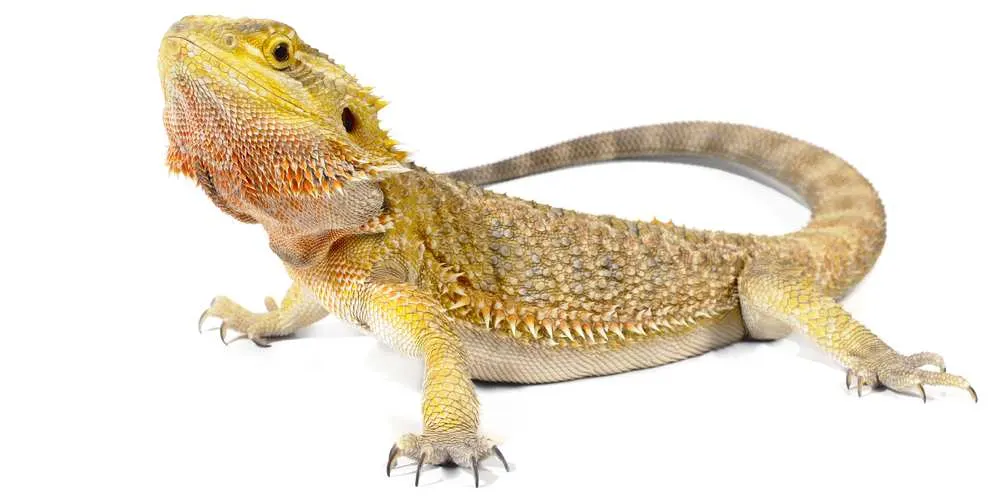
Conclusion
You have our blessing to feed your beardie peppers. Before we let you go, though, let’s just reiterate a few points.
Don’t panic if your bearded dragon accidentally ate a hot pepper; it shouldn’t be an issue since they aren’t affected by capsaicin like mammals are.
If you’re planning to feed your dragon peppers, we recommend bell peppers, the red ones to be more specific since they’re fully ripe and offer the most nutritional value. Feeding bearded dragons peppers every day isn’t recommended due to several reasons. Insufficient amounts of calcium, quite a bit of vitamin A and a lot of water are all things to consider.
Now that you have all the information you need go ahead and give your beardie a few of those peppers to munch on.
Learn More: What Can Bearded Dragons Eat? 101 Food List


